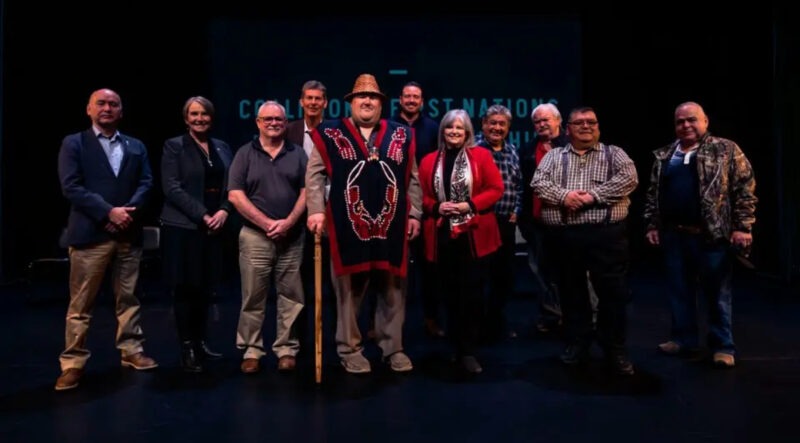“We protect wild salmon while farming salmon for Canadian families”
As the Federal cabinet meets to decide the future of aquaculture in BC, First Nations pen an open letter to Canadians on why salmon farming is critical for their communities.
Dear Canadians,
Our federal government is currently finalising discussions regarding the future of salmon farming in our traditional territories in British Columbia to introduce a responsible, realistic, and achievable Transition Plan for the sector and the re-issuance of licences that will support the business certainty that is critical to the social and economic well-being of our remote, coastal First Nations communities.
Rightsholder First Nations with salmon farms in their waters have been working closely with DFO Minister Diane Lebouthillier to ensure that this transition process respects First Nations rights, title, self-determination, economic autonomy, and our strength of claim regarding salmon farming operations.
While this issue might be trivial, if not completely unknown, to most Canadians, for our remote coastal communities keeping in-ocean salmon farming in our territories is the difference between meaningful work and unemployment, between prosperity and poverty, and even between life and death.
The effect this sector has on the social health and economies of our communities cannot be emphasized enough.
Salmon farming supports over 500 direct and indirect jobs for local First Nations (thousands for non-Indigenous) and injects over $50 million a year into our communities. For most First Nations working with salmon farming, 50-60 per cent of our economic revenue stems from salmon farming and our Indigenous businesses that support the sector.
We are not near big urban centres. We live in rural parts of the coast, some of which are only accessible by boat, float plane, or logging roads. If one of our people loses a job in our small towns, villages, or reserves, they will unlikely find another to replace it without leaving our community.
Meanwhile, our culture revolves around family and community.
Having our people, especially our young people, have meaningful work in our remote communities is priceless to them and their families.
Wealthy, urban activist groups in Vancouver spend hundreds of thousands of dollars to bombard your social media with misleading information about salmon farming. Rather than spending that money on wild Pacific salmon revitalization projects or habitat restoration, they flood your phones with emotive images and oversimplified statements with the intent to sway government decision-makers and ultimately harm our communities and our rights as Indigenous peoples.
Despite what activists say, the sector has come a long way in the past decade regarding technology, practices, transparency, community support, wild salmon enhancement, and Indigenous relationships.
Today 100 per cent of farmed salmon is raised in partnership with BC First Nations.
We believe this is a first for any industry in the province.
First Nations are now directing the sector. Nations like the Kitasoo Xai’xais, Tlowitsis and Gwa’sala-‘Nakwaxda’xw have balanced conservation, revitalizing wild salmon, and finding economic opportunities from their resources.
The Kitasoo Xai’xais have protected 52 per cent of their territory and also successfully farm Atlantic salmon with their smoked salmon product, Klemtu Spirit, now sold in grocery stores across Canada.
For a community of 420 people located 800km north of Vancouver only accessible by boat or float plane, the Kitasoo Xai’xais’ story is one of resilience and resurgence from the dark times before they engaged in salmon farming.
Their Nation went from 5 per cent employment in the Nineties to 99 per cent employment today. They have not had a suicide in 18 years.
We know that Prime Minister Trudeau and DFO Minister Lebouthillier understand the critical link between the health of our communities and the future of salmon farming.
We know they are committed to reconciliation with First Nations, as well as to the development of a responsible, realistic, and achievable transition of salmon farming in our territories.
Our Nations have also provided our own transition solutions to the Prime Minister and Minister Lebouthillier.
Canada, our First Nations have been the stewards of our lands, waters, and elements since time immemorial. Since colonization we have watched our rights, language, culture, and stewardship of our territories stripped from us. Slowly these are returning.
Our Nations take responsibility for stewardship of our territories and work with salmon farming companies, government, Western scientists, and incorporating our traditional knowledge to ensure that salmon farming is being done responsibly under the watch of our flourishing Guardian Watchmen programs.
We have proven that we have a balance; we protect wild salmon while farming salmon for Canadian families, while also growing the social and economic health of our Indigenous communities and protecting our territories.
We also know that this is a Canadian issue. Many Ontario First Nations and Atlantic provinces also rely on the finfish farming sector to keep their communities vibrant. Canadians need affordable food, and we are growing that in our territories as we speak.
Canada, we need your support more than ever – your support for our rights, our self-determination, our food security, and salmon in our waters – wild and farmed.
Trust that our Nations know how to manage our territories.
This is an incredible opportunity to show the world what true reconciliation with Indigenous peoples looks like. So let’s show them.
Please join us in asking the Government of Canada to protect our communities and re-issue the licences of salmon farms in our territories for a minimum of six years.
We thank you for your support,
The Coalition of First Nations for Finfish Stewardship from a dozen communities in coastal British Columbia.
(Image shows members of the Coalition of First Nations for Finfish Stewardship)

